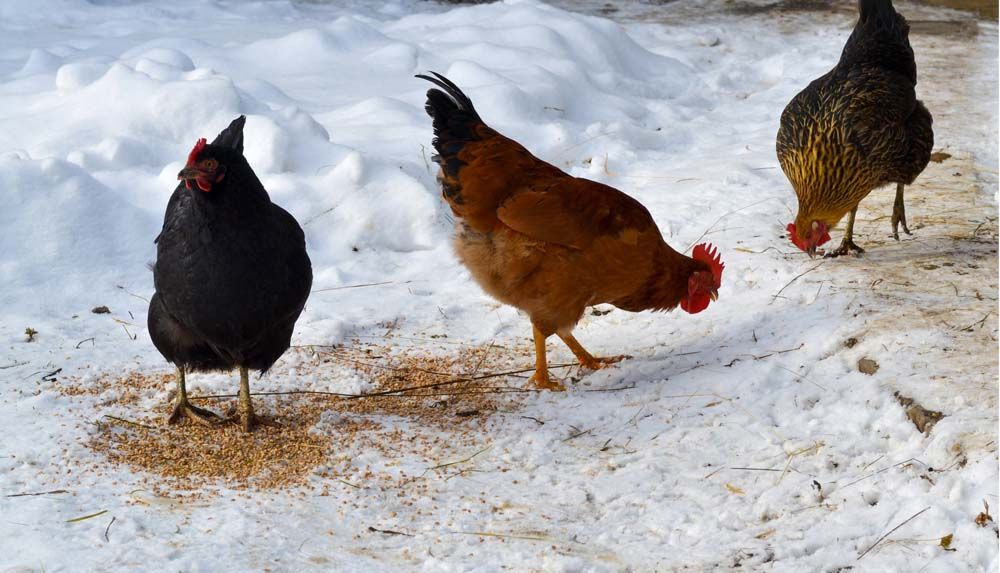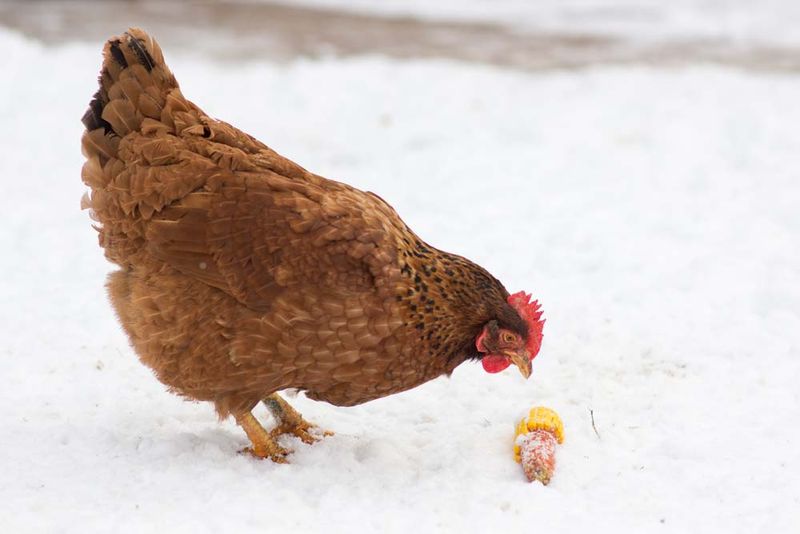What’s To Eat?
Chicken nutrition throughout the year


Though fresh water and constant free-feed is a staple year-round, chickens have specific nutritional needs for each season. Whether the snow is falling or your flock is basking in the heat of summer…proper feed is crucial to keep chickens healthy and happy no matter the weather.
Ensuring your feathered friends’ health, productivity, and overall well-being 365 days a year will provide you with years of delicious eggs and a happy, clucking flock!

Nutrition in the spring and summer
Spring and summer months mean basking in the sun, rooting for treats in the yard and supplying you with a healthy supply of delicious eggs. Protein and calcium are the most important ingredients for chickens during this season.
As the days gets longer and warmer, chickens are starting to ramp up egg production; so look for a chicken feed that that contains higher calcium. A dish filled with oyster shell will definitely give them the boost they will need.
They may also go through a pretty intense molt to toss their winter feathers and grow in a fresh plumage; some extra protein is necessary for healthy feather growth.
Offering them treats like mealworms or other insects like crickets or fly larvae are a fantastic and fun way to provide a hefty portion of protein, plus give your chickens a chance to stretch their legs chasing after these tasty morsels.
This is a good time to visit your local farmer’s markets and collect some fresh greens and vegetables—or, plant your own “chicken-friendly” garden! Not only will this provide them with additional nutrients, but it will also keep them entertained and prevent boredom.
Keep an eye on their waterer and make sure it is filled and free of algae.
Nutrition in the fall and winter
Fall and winter signal a slowdown in egg production and will require the need for extra calories to keep your chickens toasty.
But….why do chickens lay fewer eggs in the winter? It all comes down to daylight. The amount of daylight signals when to release a yolk and produce an egg. Less daylight means less eggs.
This is thought to be a survival mechanism since chicks most likely won’t survive in cold temperatures.
More feed equals a healthier, happier chicken. Chickens should be given free feed constantly, but wintertime feeding should include a several extra handfuls to allow your chickens to intake as many calories as they can. Not only do extra calories give them some extra padding to keep them warm, egg production is hard on chickens and winter gives them the opportunity to replenish their bodies with the nutrients the eggs depleted.
Choose a feed that has more carbohydrates. Scratch grains are a perfect addition to chicken feed, but it shouldn’t replace their feed entirely as it does not contain all the vitamins and minerals that a high-quality chicken feed has.
During very cold snaps, you can spoil your flock with a heaping bowl of cooked eggs, corn, bread, oatmeal as well as oil-rich seeds like sunflower or flaxseed.
Be sure to provide a heated waterer to keep water from freezing.
A year-round pantry
In short, during the warmer months, chickens need a diet rich in protein and calcium to support their feather growth and egg production. Find a calcium-rich feed as well as insects or mealworms to satisfy their protein requirements. Other goodies like fresh greens and fruits can add a variety to their diet and also provides essential vitamins and minerals.
In colder months, chickens require more energy to stay warm which can be accomplished by feeding scratch grains and high-carb chicken feed. Corn, bread, sunflower seeds or flaxseed are a wonderful additive which can provide the some extra calories to keep them toasty warm during winter.
Keep your flock’s nutritional needs in mind year-round and enjoy their eggs and antics for years to come.
About the author
Shelby Stone is a writer when she isn’t busy with her chickens, her horse Percy, Mango the parrot, and the many other animals in her family.
Tags:Chicken Chatter

Acreage Life is part of the Catalyst Communications Network publication family.
















